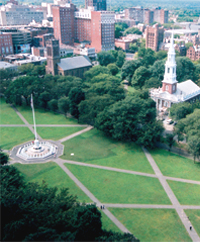The New Haven Independent

New Haven, Connecticut.
Courtesy City of New Haven
The
Independent
itself was even newer than Facebook. In 2004, Bass, a veteran investigative and news reporter in
The obvious place to turn was the Web, but Bass didn’t want to create a blog. The country didn’t need any more opinions, he felt. “What was needed in
When I came here we had two daily newspapers, we had five radio newsrooms. We have zero radio newsrooms now. The one daily paper left has a third of its former staff. Stuff just wasn’t getting covered. [2]
Bass wanted to use new technology to revive an old kind of journalism: “real community reporting, the coverage of neighborhoods and government meetings and criminal justice and public schools that could provide the raw materials for a rebuilt civic commons.” [3] Bass believed that a strong, independent press was a prerequisite for democracy, an idea that would be expressed in his site’s mission statement:
We believe that democracy starts at home, with smart, thorough, in-depth local news reporting and broad citizen debate about local issues. Thanks to the Internet, journalists and news-deprived citizens need no longer be hostages to out-of-state media conglomerates. We can reclaim our communities. Power of the press now belongs not to those who own one, but to those who own a modem. [4]
A few “hyperlocal” sites around the country inspired Bass, who especially liked
Baristanet
,
a
But how to make a hyperlocal site work as a business? Discussions at PressThink inspired Bass to see news in a different way. “Why not think of journalism as a utility like water, electricity, instead of trying to sell ads?” he says. Two other hyperlocal sites—the Gotham Gazette and Voice of San Diego —were already established as nonprofits. Like NPR’s “All Things Considered,” Bass’s site would have three revenue sources: foundations, charitable groups, and individuals. He raised $80,000 to start, which included a $50,000 grant from the Universal Health Care Foundation of Connecticut.
Independent in business.
It turned out that Bass was correct: there was demand in
The Independent team in the early months also included a capitol correspondent, a webmaster, a freelancer, and a young public school teacher who wrote diaries about her experiences in the classroom. From the outset, readers were essential—the “heart of the site,” Bailey calls them. Through comment sections and other interactive features, they helped to shape the website. “What’s interesting to me,” Bass says, is that “the conversation starts with the reporting rather than ends. Rather than doing a story, then printing a letter to the editor a day or a week later, immediately people are jumping in and taking the story to the next level, pointing out things we missed, taking it in new directions.”
Over the next few years, the
Independent
ran a number of pieces that had a tangible impact on
The Independent steadily grew, and in 2009 it had a budget of $450,000, which was substantial given it had no distribution costs. It was enough to pay six full-time reporters, six part-time reporters, and a host of freelancers. Once a homeless publication, the Independent now shared a small suite of offices (as well as some news content) with La Voz , a weekly Spanish-language newspaper.
Modeled on other sites, the Independent had itself become a model, inspiring journalists around the country to form their own hyperlocal news sites. Bass offered more than inspiration: he formed the Online Journalism Project to provide guidance to cyberjournalists and to help them secure funding for nonprofit news sites. “It’s been a heady ride,” Bass says. “It feels like I’ve joined an experiment that, like the birth of the alternative press in the 1970s and the explosion of talk radio in the 1990s, has the potential to redefine American journalism.” [6]
[1] Paul Bass, “Liberation! Guest Writer Paul Bass on Creating the New Haven Independent,” PressThink , August 8, 2006.
[2]
Author’s interview with Paul Bass in
[3]
Paul Bass, “Liberation! Guest Writer Paul Bass on Creating the
[4] "About The New Haven Independent,” New Haven Independent .
[5]
Author’s interview with Melissa Bailey in
[6]
Paul Bass, “Liberation! Guest Writer Paul Bass on Creating the